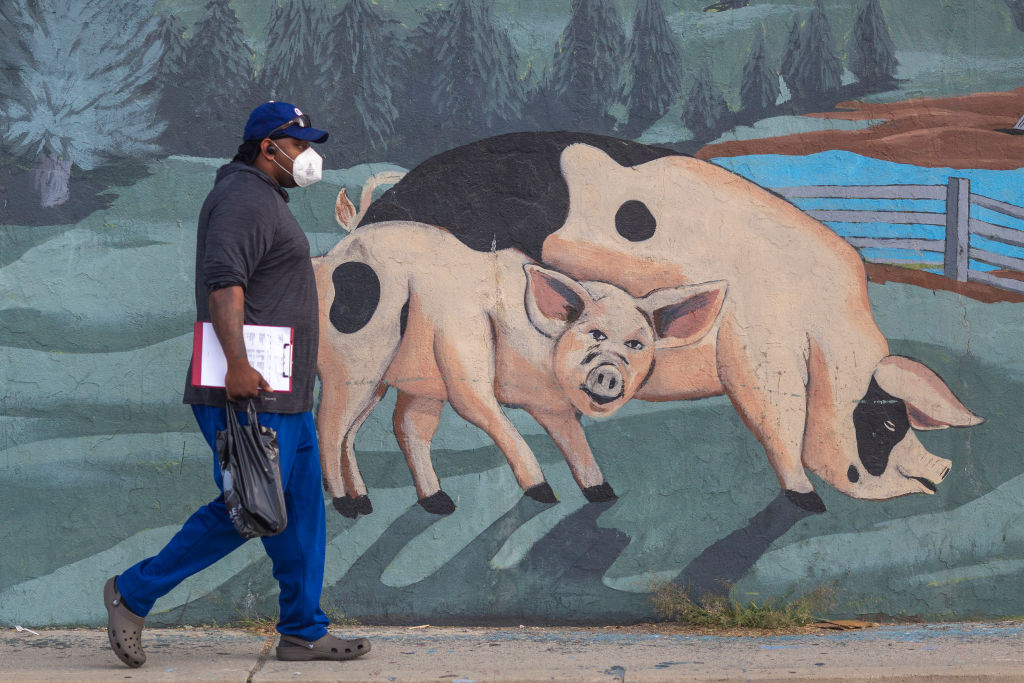Editor’s Note: Our readers responded strongly to this story when it originally ran; we’re reposting it here in case you missed it.
Food processing corporation Smithfield Foods will shut down its Vernon, California, plant and scale back operations in California, Utah and Arizona, the company announced June 10.
Smithfield “will cease all harvest and processing operations in Vernon, California in early 2023 and, at the same time, align its hog production system by reducing its sow herd in its Western region,” the company said in a news release.
“Smithfield is taking these steps due to the escalating cost of doing business in California,” the company said.
“It’s increasingly challenging to operate efficiently there,” Smithfield Foods spokesperson Jim Monroe told the Wall Street Journal. “We’re striving to keep costs down and keep food affordable.”
Owned by Hong-Kong-based conglomerate WH Group, Smithfield is the largest pork processor in the country by volume.
Like other food businesses nationwide, the company was hit by a combination of supply chain and labor shortages, the ongoing record-high inflation, and the war in Ukraine — a major producer of wheat—which sent grain prices soaring worldwide.
Because grain is a crucial ingredient in livestock feed, the impending grain shortage also spiked livestock feed prices, raising the California plant’s production costs.
Adding salt to economic injury were utility costs in California, which, according to the company’s spokesman, were 3.5 times higher per head than those in the 45 other plants in the country run by Smithfield.
Furthermore, according to Monroe, California’s regulatory environment has made it difficult for the pork processor to do business there.
The spokesman pointed to Proposition 12, a 2018 voter-approved rule, which mandated that food processing companies confining pigs and sows must have adequate spaces for the animals to lie down and move around.
The regulation effectively rendered confining such animals in smaller stalls unlawful, to the dismay of food producers, who pointed out that the regulation would raise food costs and push up production costs.
In addition to closing down the Vernon plant, the company said in the news release that it would look at “strategic options to exit its farms in Arizona and California” in addition to scaling back its sow herd in Utah.
“Smithfield is providing transition assistance to all impacted employees, including relocation options to other company facilities and farms as well as retention incentives to ensure business continuity until early next year,” the company said.
Smithfield also said that it had reached an agreement with the United Food and Commercial Workers International Union, the International Brotherhood of Teamsters and the International Union of Operating Engineers on shutting the Vernon facility.
“We are grateful to our team members in the Western region for their dedication and invaluable contributions to our mission. We are committed to providing financial and other transition assistance to employees impacted by this difficult decision,” Smithfield Chief Operating Officer Brady Stewart said.
The closure of the company comes as food prices rise nationwide amidst the ongoing baby formula shortage, growing inflation and soaring gas prices. Adding to the threats facing the nation’s food security is a looming worldwide fertilizer shortage, from which the U.S. is not exempt.
“We are deeply concerned about the combined impacts of overlapping crises jeopardizing people’s ability to produce and access foods, pushing millions more into extreme levels of acute food insecurity,” United Nations Food and Agriculture Organization Director-General Qu Dongyu warned.
“We are in a race against time to help farmers in the most affected countries, including by rapidly increasing potential food production and boosting their resilience in the face of challenges,” Qu said.
This article appeared originally on The Western Journal.















 Continue with Google
Continue with Google